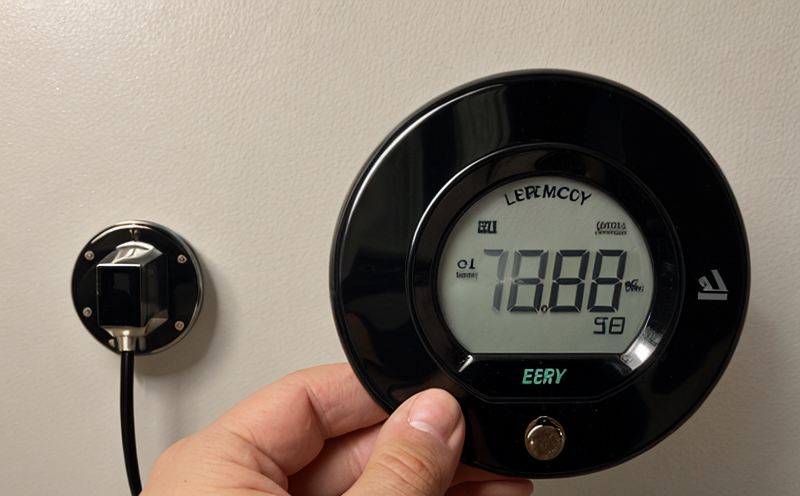UL 873 Energy Efficiency Testing for Controllers
The UL 873 standard is a critical benchmark in the electronics testing sector, ensuring that controllers are designed to efficiently manage and optimize energy consumption. This standard is particularly important as it addresses the growing concern over energy efficiency in today’s electronic devices. The primary goal of this test is to verify that controllers operate within specified parameters, thereby reducing energy waste.
The UL 873 test focuses on evaluating various aspects of a controller's performance, including its ability to regulate power supply, minimize standby consumption, and manage the overall efficiency of an electrical system. This testing process involves a series of rigorous steps designed to simulate real-world conditions under which the controller will operate.
Firstly, the specimen must be prepared according to strict guidelines provided by UL standards. This includes ensuring that all components are properly assembled and connected as they would be in a final product. Once the specimen is ready, it undergoes a series of tests aimed at assessing its energy efficiency performance. These tests typically involve measuring power consumption under different load conditions, checking for any excessive standby power usage, and evaluating how effectively the controller manages energy distribution.
The instrumentation used during these tests plays a crucial role in ensuring accurate results. High-precision meters are employed to monitor electrical parameters such as voltage, current, and power factor. Additionally, specialized software tools help analyze data collected from these instruments, providing detailed insights into the specimen's performance. It is essential that all equipment used complies with relevant international standards (e.g., IEC 61238) to ensure consistency across different laboratories.
The acceptance criteria for passing this test are stringent and designed to guarantee high-quality controllers meeting modern sustainability goals. A controller must demonstrate consistent energy savings without compromising functionality or reliability. For instance, it should show a significant reduction in standby power compared to non-compliant alternatives while maintaining stable operation even under varying environmental conditions.
In summary, the UL 873 test is an indispensable tool for manufacturers aiming to produce efficient and environmentally friendly electronic devices. By adhering to this standard, companies can enhance their market competitiveness by offering products that meet strict regulatory requirements globally.
Scope and Methodology
| Test Parameter | Description |
|---|---|
| Power Consumption Measurement | This involves measuring the amount of electricity consumed by the controller under various operating conditions, including idle state and full load operation. |
| Standby Power Usage Evaluation | The test assesses how much power is drawn from the main source when the device is not actively performing its intended function but remains connected to it. |
| Efficiency Calculation | This requires calculating the ratio of output energy provided by the controller relative to the input energy supplied, ensuring minimal loss during conversion processes. |
| Environmental Stress Testing | The specimen is subjected to simulated environmental factors such as temperature changes and humidity levels to ensure robust performance under diverse conditions. |
In-depth analysis of these parameters helps determine whether the controller meets the specified efficiency requirements outlined in UL 873. Each measurement point plays a vital role in providing comprehensive insights into the overall energy management capabilities of the device.
Why Choose This Test
Selecting UL 873 energy efficiency testing for controllers is advantageous due to several key factors:
- Regulatory Compliance: Many countries mandate adherence to international standards like UL 873 as part of their regulatory frameworks. By ensuring compliance, manufacturers can avoid potential fines and penalties associated with non-conformity.
- Increased Market Demand: Consumers increasingly favor eco-friendly products, making energy-efficient controllers more attractive in the marketplace. Passing this test enhances brand reputation and customer trust.
- Sustainability Benefits: Efficient controllers contribute significantly to reducing global energy consumption, aligning with broader environmental goals set by governments worldwide.
- Competitive Edge: Demonstrating superior energy efficiency sets your product apart from competitors who may not prioritize this aspect of their offerings.
Ultimately, choosing UL 873 testing ensures that you meet stringent industry standards while also contributing positively to environmental sustainability efforts. This commitment positions your company as a leader in responsible manufacturing practices.
International Acceptance and Recognition
The UL 873 standard enjoys widespread recognition across numerous countries, reflecting its importance in promoting energy-efficient controller technology:
- Australia: Compliance with this standard is recognized by authorities responsible for enforcing electrical safety regulations.
- New Zealand: The New Zealand Standards Institute endorses UL 873 as a benchmark for assessing energy efficiency.
- European Union: Several member states incorporate elements of UL 873 into their national standards, emphasizing the global applicability of these guidelines.
The acceptance and adoption of this standard by major regulatory bodies underscore its significance in guiding manufacturers towards creating more sustainable products. As such, certification according to UL 873 can open up new markets for your product, enhancing both commercial prospects and environmental impact.





